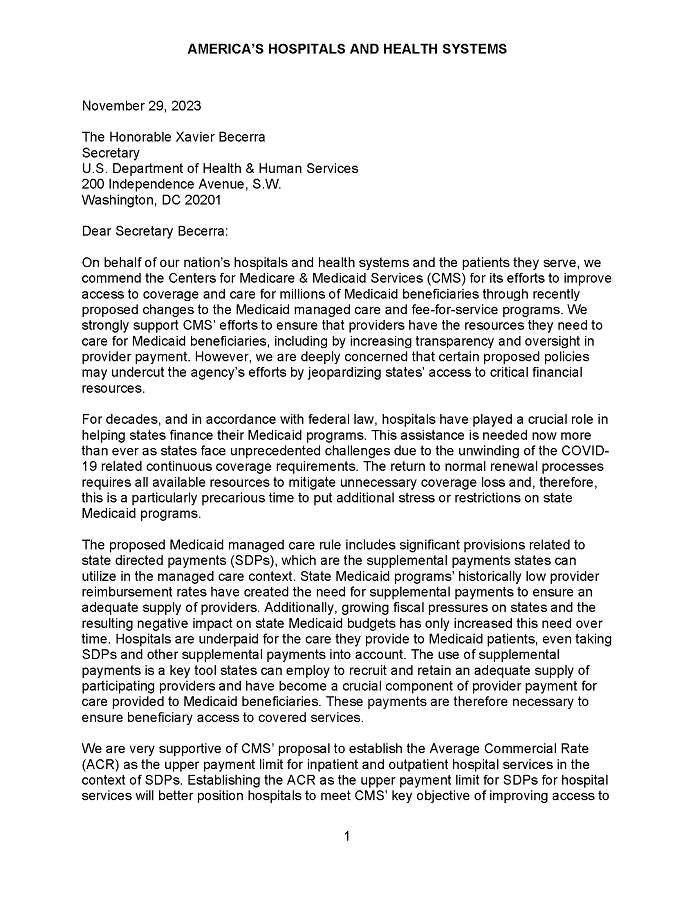

America’s Hospitals and Health Systems Letter to HHS on CMS Medicaid State Directed Payments (SDPs)
America’s Hospitals and Health Systems
November 29, 2023
The Honorable Xavier Becerra
Secretary
U.S. Department of Health & Human Services
200 Independence Avenue, S.W.
Washington, DC 20201
Dear Secretary Becerra:
On behalf of our nation’s hospitals and health systems and the patients they serve, we commend the Centers for Medicare & Medicaid Services (CMS) for its efforts to improve access to coverage and care for millions of Medicaid beneficiaries through recently proposed changes to the Medicaid managed care and fee-for-service programs. We strongly support CMS’ efforts to ensure that providers have the resources they need to care for Medicaid beneficiaries, including by increasing transparency and oversight in provider payment. However, we are deeply concerned that certain proposed policies may undercut the agency’s efforts by jeopardizing states’ access to critical financial resources.
For decades, and in accordance with federal law, hospitals have played a crucial role in helping states finance their Medicaid programs. This assistance is needed now more than ever as states face unprecedented challenges due to the unwinding of the COVID-19 related continuous coverage requirements. The return to normal renewal processes requires all available resources to mitigate unnecessary coverage loss and, therefore, this is a particularly precarious time to put additional stress or restrictions on state Medicaid programs.
The proposed Medicaid managed care rule includes significant provisions related to state directed payments (SDPs), which are the supplemental payments states can utilize in the managed care context. State Medicaid programs’ historically low provider reimbursement rates have created the need for supplemental payments to ensure an adequate supply of providers. Additionally, growing fiscal pressures on states and the resulting negative impact on state Medicaid budgets has only increased this need over time. Hospitals are underpaid for the care they provide to Medicaid patients, even taking SDPs and other supplemental payments into account. The use of supplemental payments is a key tool states can employ to recruit and retain an adequate supply of participating providers and have become a crucial component of provider payment for care provided to Medicaid beneficiaries. These payments are therefore necessary to ensure beneficiary access to covered services.
We are very supportive of CMS’ proposal to establish the Average Commercial Rate (ACR) as the upper payment limit for inpatient and outpatient hospital services in the context of SDPs. Establishing the ACR as the upper payment limit for SDPs for hospital services will better position hospitals to meet CMS’ key objective of improving access to high quality health care services for Medicaid beneficiaries. However, we are concerned that other proposals would restrict state financing options in a way that would work against these objectives. Specifically, we are deeply concerned with CMS’ proposed restrictions on states’ use of provider-based funding sources, such as provider taxes, to finance Medicaid payments. We also are concerned about CMS’ proposed alternatives to artificially limit the growth in SDPs, particularly for hospital-based SDPs. Limiting SDP amounts to the Medicare rate or an aggregate cap in total payments as a percentage of managed care spending would add to the financial stress hospitals currently face. Median hospital operating margins were negative throughout 2022 and into the beginning of 2023.1 It is no surprise, therefore, that we have seen record hospital closures in recent years, and many hospitals are struggling to maintain full service lines.
We therefore request that CMS not move forward with its proposed restrictions on states’ use of provider-based funding sources, such as provider taxes, to finance Medicaid payments. Such restrictions could have dire consequences for coverage and access to care as states would be unable to replace lost funds with other sources of revenue. More importantly, finalizing such policies could have a disproportionate impact on access to care for the historically marginalized populations Medicaid is intended to serve.
Thank you for your consideration of these concerns. We look forward to working with you on these proposed policies so that we can continue providing access and care to Medicaid patients in our communities.
Sincerely,
America’s Essential Hospitals
American Hospital Association
Association of American Medical Colleges
Catholic Health Association of the United States
Children’s Hospital Association
Federation of American Hospitals
National Association for Behavioral Healthcare
Vizient, Inc.


